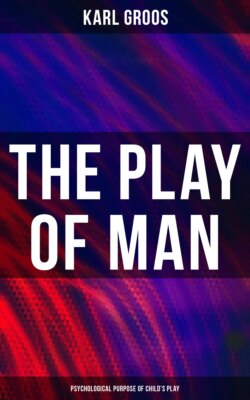Читать книгу The Play of Man - Psychological Purpose of Child's Play - Karl Groos - Страница 13
5. Sensations of Hearing37
ОглавлениеIn the consideration of this important sphere of play activity we encounter one of the special problems of our subject. Since Darwin’s time it has been customary to explain the art of tone and the musical element in poetry as an effect of sexual selection. But while I am convinced that these arts do on one side bear the very closest relation to sexual life, yet I believe that Spencer is right in warning us that the exclusive reference of such phenomena to sexual selection is hardly warranted. The courtship arts of birds, it is true, are sufficiently striking, yet we must remember, aside from the fact that prominent investigators have raised serious objections to the application of the theory even to them, that birds have but a distant kinship to man. As regards our closer relatives in the animal world, Darwin himself says, “With mammals the male appears to win the female much more through the law of battle than through the display of his charms.”38 And among mammals, again, monkeys are not distinguished by any special arts of courtship. The acoustic phenomena cited by Darwin are summed up in the cry of the howling ape and the musical notes of the species of Gibbon from Borneo and the Sumatran ape described by Selenka.39 Of other such arts, only one is noteworthy in monkeys as being also practised by man, and even that not directly in connection with love-making—namely, the disposition to display the back. It has not yet been proved that the monkey’s wonderful dexterity serves him especially in courtship. The supposition has much in its favour, it is true, but finds little support from what we know of his sexual life. Brehm covers the ground pretty well when he says, “Knightly courtesy serves him little with the weaker sex; he must take by force the rewards of love.” Ethnology shows us, too, that an exclusive or even a preferential reference of music and poetry to sexuality can not be assumed among primitive races. Having thus stated the doubts in advance, it may be interesting to glance once more over the psychology of play, with a view to discovering which arts and æsthetic pleasures may have arisen independently of sex. In such a review of hearing plays we are likely to find much which tends to expand and also to limit the Darwinian theory—nothing which will refute it.
Hearing plays may serve merely as a means for the satisfaction of acoustic impulses, or to give necessary exercise to motor apparatus, and, while this whole inquiry can not be said to penetrate further than to the antechamber of æsthetic perception and artistic production, an obvious distinction at once becomes apparent—namely, that between the receptive or hearing function and the production of sounds and tones. From the suckling’s delight in his own guttural gurglings to the most refined enjoyment of a concert-goer, from the uncouth efforts of the small child to produce all sorts of sounds, to the creative impulse which controls the musical genius, there is, in the light of history, a progressive and consistent development.
